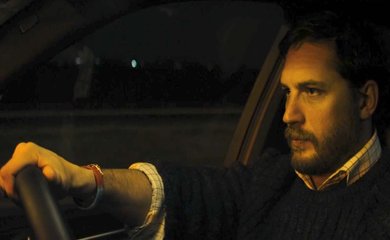Where do transatlantic beasts like Tom Hardy retreat to at night to escape the glare and glower of Hollywood? Which low budget vehicle will he squeeze into to prove his muscular acting prowess? In “Locke” the vehicle is literal and permanent for 85 minutes, a BMW X5, the wheeled home of gangsters, the pride of motherhood who would see their children safe from the Mad Maxian peril of the school run. Perhaps Hardy was getting the feel of the wheel before he inhabits the ghost of Mel Gibson’s former glory.
Hardy is Ivan Locke, a simmering Welsh Dragon, quiet and stoic, an exceptional engineer locked into his own dogma, a moral code that sees him drive from Birmingham to London in the middle of the night. Whatever has summoned him leads Locke to abandon his raison d’être, the largest pouring of concrete in Europe, to secure a 55-floor building. Locke savors the word, making love to each syllable as it rolls of his tongue, “Con-crete.” He could be Richard Burton waxing lyrical about Dylan Thomas or Liz Taylor.
Burton would have sneered and chewed his way through the dashboard scenery, those teeth clenched like daggers as he spat out the word, “Con-CRETE.” What a show that would have been, the tempestuous anger spreading through the traffic like a pile up. Hardy is more subtle and better for it. His Locke is a highly skilled artisan, a man prized by his masters in Chicago and nearly indispensible. His existential rage, his hard won family values are at war with his second rate upbringing, the conflict lingers just under the surface barely kept in check by his rigid professionalism.
Locke’s entire world is under threat. His hands-free set is fraught with problems that come in waves like the oncoming traffic he passes in the night. Voices intercept the darkness forcing Locke to take, “Practical steps” to protect his crumbling empire, to save the concrete from becoming as hated as Brutalist architecture, “Do it for the concrete, which is as delicate as blood!” At times he talks to his dead father, a creeping presence that could be an unnecessary luxury in a film that is otherwise compact and ingenious. Could we imagine his father as Richard Burton, surely the paternal spirit to every modern day British star who possesses that Shakespearean thunder?
Steven Knight directs Locke’s gradual disintegration with dreamlike precision, the whoosh and vroomp of passing vehicles are strangely satisfying, hypnotic like Danny’s trike in “The Shinning.” Who knows what other thrills are unfolding in the overtaking traffic? Hardy’s face says it all as those familiar voices invade his BMW like the guilt in Marion Crane’s head. For all Locke’s practicality he is a dreamer with visions of towering beauty, “Do it for the piece of sky that we are stealing.” Maybe he should have turned his eye downward rather than skyward and looked upon the concrete footprints he leaves in his kitchen.

